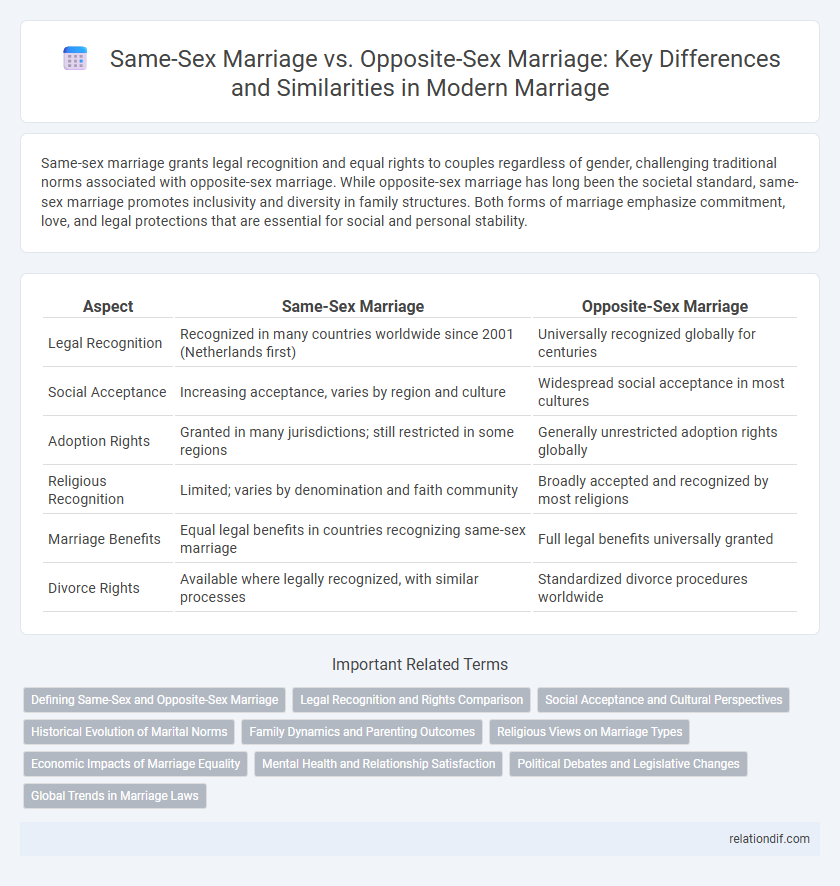Same-sex marriage grants legal recognition and equal rights to couples regardless of gender, challenging traditional norms associated with opposite-sex marriage. While opposite-sex marriage has long been the societal standard, same-sex marriage promotes inclusivity and diversity in family structures. Both forms of marriage emphasize commitment, love, and legal protections that are essential for social and personal stability.
Table of Comparison
| Aspect | Same-Sex Marriage | Opposite-Sex Marriage |
|---|---|---|
| Legal Recognition | Recognized in many countries worldwide since 2001 (Netherlands first) | Universally recognized globally for centuries |
| Social Acceptance | Increasing acceptance, varies by region and culture | Widespread social acceptance in most cultures |
| Adoption Rights | Granted in many jurisdictions; still restricted in some regions | Generally unrestricted adoption rights globally |
| Religious Recognition | Limited; varies by denomination and faith community | Broadly accepted and recognized by most religions |
| Marriage Benefits | Equal legal benefits in countries recognizing same-sex marriage | Full legal benefits universally granted |
| Divorce Rights | Available where legally recognized, with similar processes | Standardized divorce procedures worldwide |
Defining Same-Sex and Opposite-Sex Marriage
Same-sex marriage is legally recognized union between two individuals of the same gender, granting them equal rights and responsibilities as opposite-sex couples. Opposite-sex marriage refers to the traditional union between a male and a female partner, typically acknowledged by law and society with defined legal benefits. Both forms of marriage establish a legal commitment that includes rights related to inheritance, taxation, and spousal support.
Legal Recognition and Rights Comparison
Same-sex marriage and opposite-sex marriage differ significantly in legal recognition and rights, with many countries now granting full marriage equality, ensuring identical legal protections such as inheritance, tax benefits, adoption rights, and spousal healthcare decisions. Despite progress, some regions still restrict same-sex marriage, denying couples access to critical legal frameworks that opposite-sex couples take for granted, including social security benefits and marital property rights. Legal disparities impact family stability and societal acceptance, highlighting the ongoing global need for comprehensive legal reforms to achieve equal marriage rights.
Social Acceptance and Cultural Perspectives
Same-sex marriage faces varying levels of social acceptance worldwide, with progressive countries embracing equal rights while some cultures resist due to traditional or religious beliefs. Opposite-sex marriage remains widely accepted across most societies, often seen as a cultural norm rooted in historical practices. Shifting perspectives on same-sex marriage highlight evolving social values and the ongoing struggle for inclusivity and recognition in diverse cultural contexts.
Historical Evolution of Marital Norms
Same-sex marriage has evolved from centuries of legal prohibitions and social stigmas to gaining recognition in over 30 countries since the early 21st century, reflecting significant shifts in cultural attitudes and human rights advocacy. Opposite-sex marriage, historically rooted in religious and patriarchal traditions, has undergone transformations influenced by changing gender roles and legal reforms promoting equality and consent. The historical evolution of marital norms highlights the expanding definition of marriage as a civil institution inclusive of diverse partnerships beyond traditional heterosexual unions.
Family Dynamics and Parenting Outcomes
Same-sex marriage and opposite-sex marriage both provide stable family dynamics that foster healthy child development, with research indicating no significant differences in parenting outcomes between the two. Children raised by same-sex couples often experience supportive, nurturing environments comparable to those of opposite-sex parents, benefiting from similar emotional and social stability. Legal recognition of same-sex marriage enhances parental rights and protections, contributing positively to family well-being and child security.
Religious Views on Marriage Types
Religious views on same-sex marriage vary widely, with many traditional faiths such as Islam, Orthodox Judaism, and conservative Christianity opposing it based on scriptural interpretations that define marriage strictly as a union between one man and one woman. Conversely, some religious denominations including the United Church of Christ, Reform Judaism, and certain branches of Protestantism support same-sex marriage, emphasizing themes of love, equality, and social justice in their theological frameworks. The debate remains a deeply divisive issue within religious communities, often influencing broader social and legal attitudes toward marriage laws and civil rights.
Economic Impacts of Marriage Equality
Marriage equality significantly boosts local economies by increasing demand for wedding-related services, tourism, and hospitality industries. Studies show same-sex marriage legalization leads to higher tax revenues and reduced public expenditures on social support due to improved financial stability among couples. Economic benefits also include enhanced workplace productivity and employee retention driven by inclusive policies supporting all married partners.
Mental Health and Relationship Satisfaction
Research indicates that same-sex marriages report comparable levels of mental health and relationship satisfaction to opposite-sex marriages, emphasizing emotional intimacy and mutual support as critical factors. Studies show that acceptance and social support significantly enhance mental well-being in both marriage types, while discrimination adversely impacts relationship quality. Data from the American Psychological Association reveal that same-sex couples often face unique stressors but maintain strong commitment and happiness similar to opposite-sex couples.
Political Debates and Legislative Changes
Same-sex marriage has sparked intense political debates, with many countries enacting legislative changes to either legalize or ban it, reflecting evolving societal values and human rights considerations. Opposite-sex marriage remains widely accepted, yet some political discussions focus on equalizing rights and benefits to ensure non-discrimination toward same-sex couples. Legislative reforms often highlight the tension between conservative and progressive agendas, impacting the legal recognition and social acceptance of marriage diversity.
Global Trends in Marriage Laws
Global trends in marriage laws reveal a growing acceptance of same-sex marriage, with over 30 countries legally recognizing these unions, including the United States, Canada, and various European nations. Opposite-sex marriage remains universally legal but faces evolving definitions and rights to accommodate diverse family structures. International human rights organizations emphasize equal marriage rights as a fundamental aspect of social justice and equality worldwide.
Same-Sex Marriage vs Opposite-Sex Marriage Infographic

 relationdif.com
relationdif.com